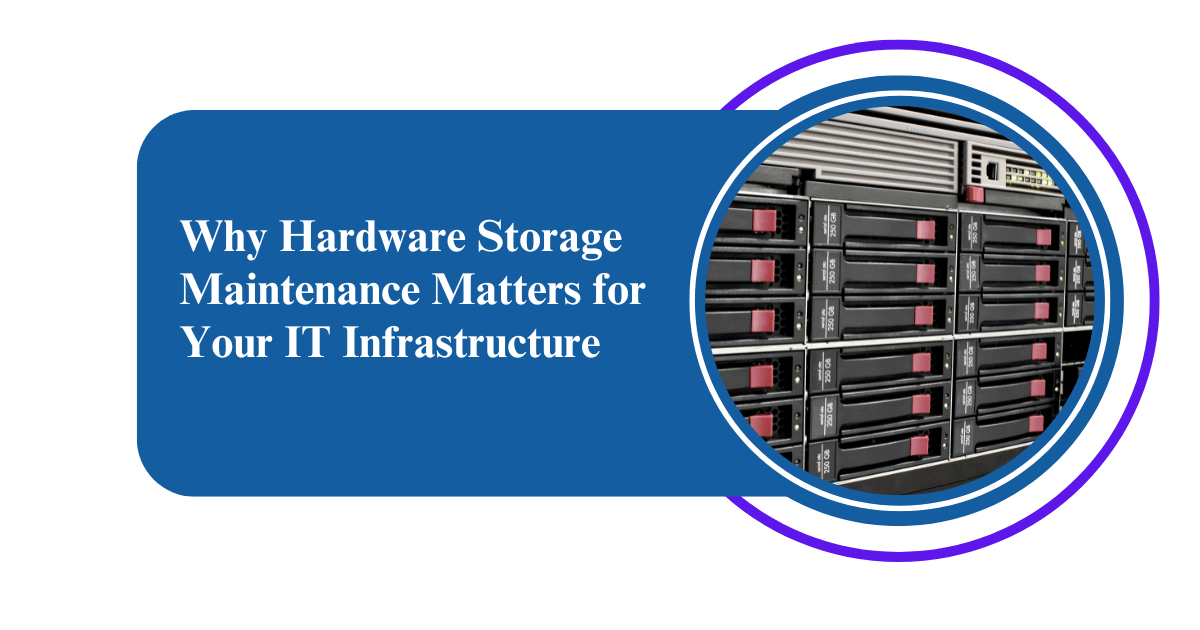Why Hardware Storage Maintenance Matters for Your IT Infrastructure
Maintaining hardware storage is essential for businesses that depend on reliable access to data. A good maintenance plan keeps storage systems working well, reduces unexpected downtime, and helps equipment last longer. This means businesses can depend on their data when they need it, run more efficiently, and support their growth over time.
Regular upkeep also ensures that storage systems stay compatible with software updates and new applications. This helps keep the IT environment secure and running smoothly, so businesses can avoid issues and stay up to date with technology.
Understanding Hardware Storage: How It Works
Hardware storage includes all the physical devices that store, manage, and protect data, serving as the backbone for accessing and securing valuable information. These devices can vary widely, from traditional hard drives and SSDs to advanced systems like NAS (Network-Attached Storage) and SAN (Storage Area Network). Each device type offers specific benefits for different storage needs, from personal computing to large-scale data management in businesses. By investing in hardware storage, companies ensure they have reliable systems to store data locally, keeping it accessible when and where it’s needed.
Dedicated hardware storage enables businesses to maintain direct control over their data on-site, unlike offsite cloud solutions. This setup lowers the risk of data breaches and unauthorized access. With storage solutions like NAS and SAN, businesses can easily organize and access large amounts of data, ensuring a secure environment that supports everyday operations and meets compliance requirements.
NAS Storage
NAS (Network-Attached Storage) is a storage system that connects to a network, letting many users access data from one central place. Because of this, NAS systems are popular in businesses for sharing files, backing up data, and making information easy to reach. The team provides maintenance services to keep these systems working well.
They offer fully set up NAS systems and quality refurbished parts tailored to meet each business’s specific needs for data sharing. Additionally, their support includes professional installation and integration, making sure every NAS system works reliably.
Key Features:
- File Sharing: Enables multiple users to access and share files over a network.
- Ease of Use: Usually easier to set up and manage, making it ideal for small to medium-sized businesses and home users.
- Cost-Effective: Generally less expensive than SAN solutions, making it accessible for users with lower storage needs.
- Scalability: Can be expanded by adding more drives or NAS units as storage needs grow.
SAN Storage
SAN (Storage Area Network) storage connects storage devices to servers, enabling high-speed data processing that is ideal for large enterprises and data-intensive applications. Unlike NAS, SAN is dedicated to direct storage access, ensuring optimal performance for critical applications. The team specializes in SAN maintenance and support, offering customized solutions and spare parts delivered within 72 hours. They set up, integrate, and configure SAN systems to meet specific business needs, supporting efficient and reliable data management.
Key Features:
- Block Storage: Offers storage as blocks rather than files, making it suitable for applications that require high performance.
- High Performance: Provides faster data transfer speeds and low latency, ideal for databases and critical applications.
- Redundancy and Reliability: Often includes features like data replication and failover capabilities to ensure high availability.
- Complexity: More complex to set up and manage compared to NAS, typically requiring specialized knowledge.
Importance of Hardware Storage Maintenance
Regular maintenance of hardware storage is essential for ensuring reliable data access and smooth business operations. When businesses invest in storage upkeep, they not only extend the life of their storage systems but also boost security, keeping valuable data protected. Regular maintenance helps prevent unexpected breakdowns, so companies can access their information when needed and minimize costly downtime.
Agrius IT’s maintenance services offer a range of solutions to meet various storage needs, including NAS and SAN systems and customized storage setups. With Agrius IT’s expert support, businesses can rely on prompt and thorough assistance, ensuring their IT investments deliver maximum value. These maintenance solutions enable companies to prevent issues and ensure efficient system performance, letting them concentrate on core activities.
faq
Hardware storage maintenance ensures that your data storage systems operate efficiently, reducing the risk of data loss or system downtime. This maintenance also helps extend the lifespan of your storage equipment.
NAS storage connects to a network, allowing multiple users to share access to a centralized storage system. Therefore, it is ideal for small to mid-sized environments. SAN storage connects directly to servers, providing high-speed data access ideal for larger enterprises with critical applications.
Agrius IT offers a range of services for NAS and SAN systems, including custom configurations, installation, and integration. We also provide quick delivery of spare parts and offer after-sales support to keep systems running smoothly.
Customized hardware storage solutions help businesses optimize configurations for their data needs, enhancing efficiency and performance while reducing unnecessary costs.
Agrius IT delivers spare parts for NAS and SAN systems within 72 hours to minimize downtime during maintenance.
Additionally, Agrius IT supports upgrades and installations to enhance your storage system for growing business needs.
Agrius IT provides secure data disposal options, including physical destruction and certified data erasure. As a result, these methods help maintain confidentiality and comply with data protection standards.
Yes, Agrius IT provides maintenance and support for End-of-Life (EOL) and End-of-Service-Life (EOSL) storage systems, allowing businesses to extend the lifespan of their older hardware.



